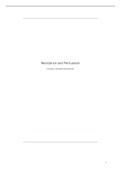Resistance and Persuasion
Lectures, seminars and articles
1
,Lecture 1: Introduction
Resistance = a reaction against change, the ability to withstand a persuasive attack, an outcome: not
being moved by pressures to change, a motivational state: motivation to oppose and counter pressures
to change. According to Knowles & Linn (2004), the clear definition of resistance is that it is a reaction
against change, and it becomes evident in the presence of some pressure for change. They also show
that resistance has a dual definition in psychology:
1. It defines an outcome: the outcome of not being moved by pressures to change.
2. It defines a motivational state: the motivation to oppose and counter pressures to change.
Lecture 2: Self-control
Chugging = Charity mugging, street fundraisers.
Fennis, Janssen, & Vohs (2009) firstly looked into social influence techniques.
• Foot-in-the-door: start with a small request and make it bigger (Heuristic principle of
consistency, we have a tendency to stay consistent). Meta-analysis shows that FITD is most
effective when the initial request is highly involving (demanding cognitive operations and/or
active self-presentations), as high-level intellectual processing depletes self-control.
• Door-in-the-face: start with a large request and make it smaller (Heuristic principle of
reciprocity, we have a tendency to return favors).
• Lowball: when an item is initially offered at a lower price than one expects in order to get the
buyer to commit; then, the price is suddenly increased.
• Disrupt-then-reframe: when one disrupts a traditional request script and then follows this with
a new framing of the request.
Key question in study: How can we explain automatic, mindless compliance in a social influence
situation? They thought from dual-process models that we tend to fall back on automatic behavior when
we are not motivated or not able to process all the information that we could have used to make a
decision.
2
, Self-control = the basic ability to actively control our emotions, thoughts and behaviors. If we want to
function in life and achieve goals, we need to control our impulses (if you want to stick to a diet, you
need to be able to control yourself). Limited-resource model of self-control (Baumeister & Vohs,
2007): after you use your self-control resources on a certain task, the resources will be temporarily
depleted (after a workout, you need to give your muscles rest). Because of this you perform less on a
second self-control task. On that point, we fall back on passive and automatic behavior for a while (=
ego depletion). Ego depletion/resource depletion/self-control depletion = Temporary failure of self-
control. When self-control is lowered, you take the easiest way out (often Heuristics). We don’t engage
in rational thinking anymore but choose heuristics (mental shortcuts/ social rules).
Studies have shown that when you actively
respond to an initial request of an influence
technique, this depletes our mental resources.
At the point when our self-control has been
brought down, you become more likely to
comply with the target request of an influence
technique because we are more likely to fall
back on automatic behavior. Highly involving
entails demanding cognitive operations and/or active self-presentation. Studies showed that high-level
intellectual processing as well as self-presentation depletes self-control resources.
2-stage model that they developed (hypothesis): if we
respond to initial requests, this depletes our self-control.
When our self-control is relatively low, we are more
likely to rely on our heuristics and this increases the odds
of compliance with the target request technique. They
performed 12 studies to test this model.
Wheeler et al. (2007) showed that when people are depleted, they show less resistance to persuasion.
They showed a counter attitudinal message and came up with strong and weak arguments. For depleted
people, as long if there is an argument, they’ll take it, whether it is strong or weak. This is because they
lack the ability to counterargue. It is called the because-Heuristic.
Bottom line of the initial study: In a state of depletion (being tired of taking so much self-control), it is
more difficult to resist persuasion. So, resistance to persuasion may depend on our ability to control our
3





